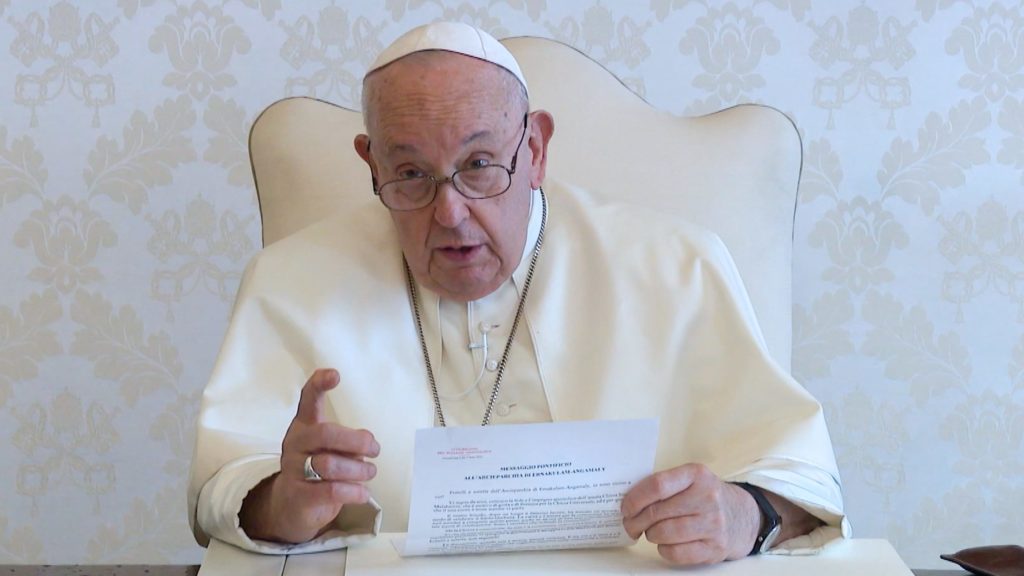Telling Syro-Malabar Catholics in India's Archdiocese of Ernakulam-Angamaly that he does not want to see anyone excommunicated, Pope Francis pleaded with the priests and faithful to end their dispute over the way the Eucharist is celebrated.
With some priests calling into question the authenticity of his previous letters and his appointment last August of a special envoy, Pope Francis communicated with members of the archdiocese in a video released Dec. 7 "so no one has any more doubts about what the pope thinks," he said.
"In the name of the Lord, for the spiritual good of your church, of our church, I ask you to heal this rupture. It is your church; it is our church. Restore communion; remain in the Catholic Church," the pope said in the video.
Also Dec. 7, the Vatican released a letter from Pope Francis to Cardinal George Alencherry accepting his resignation as head of the archdiocese and as major archbishop of the Syro-Malabar Catholic Church.
After years of debate about tradition, Latinization and modernization of the liturgy, in 1999 the synod of bishops of the Syro-Malabar church issued uniform rubrics for the celebration of the Eucharist, called the Holy Qurbana by members of the Eastern-rite church. They were trying to end a situation in which some priests faced the altar during the entire liturgy, while others faced the congregation throughout the liturgy. The bishops' decision was to have the priest face the altar during the eucharistic prayer but face the congregation during the Liturgy of the Word and again after Communion.
Priests in most Syro-Malabar dioceses quickly complied with the bishops' decision, although dispensations were issued for the Archdiocese of Ernakulam-Angamaly and a few other territories. The bishops decided to end those dispensations in November 2021.
The Archdiocesan Movement for Transparency, a group of priests, religious and laity in Ernakulam-Angamaly, protested the way the dispensation was revoked and insisted on continuing to celebrate the entire liturgy with the priest facing the congregation as had been the practice since 1970. The group claims to have the support of almost all the priests and faithful of the archdiocese.
The dispute has led to protests, hunger strikes and shoving matches, including inside St. Mary's Cathedral in Kochi, which led to its closure.
In his video, Pope Francis told Catholics of the archdiocese: "See to it that by Christmas 2023 your archdiocese humbly and faithfully agrees to get in step with the rest of your church, respecting all the directions of your synod."
Without mentioning specifics, the pope said he knows there are reasons for opposing the synod's rubrics "that have nothing to do with the celebration of the Eucharist," and he defined those reasons as "worldly."
"They do not come from the Holy Spirit," he said. "And if they don't come from the Holy Spirit, they come from somewhere else."
Speaking specifically to the priests, Pope Francis urged them to "remember your ordination and the commitments you assumed," including the promise of obedience to the bishop.
"Be careful that the devil does not persuade you to turn yourselves into a sect," he said to all the Syro-Malabar faithful who object to the uniform liturgy.
Describing what happens when a person excommunicates themselves, the pope told them: "Don't force the competent church authority to acknowledge that you have left the church because you are no longer in communion with your pastors and with the successor of the Apostle Peter, who is called to confirm all the brothers and sisters in the faith and keep them in the unity of the church."
"With great sadness," he said, the bishops would have to do so, and "I don't want to reach that point."
"May the Eucharist be the model of your unity," he said. "Do not shatter the Body of Christ, which is the church, lest you eat and drink your condemnation."
In his letter to Cardinal Alencherry, Pope Francis noted that he had asked to resign in 2019 in an attempt to end some of the tensions and divisions in the archdiocese, but the Syro-Malabar synod of bishops advised the pope not to accept his resignation and he agreed, appointing an apostolic administrator instead.
Now, the pope said, "I consider your resignation not as the conclusion, but the fulfilment of your service. Indeed, this step represents a further witness of fidelity to the Gospel and a new way of serving the church, above all through contemplative and intercessory prayer, as well as by continuing to offer your counsel to the dicasteries of the Roman Curia of which you are a member."

